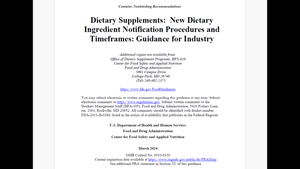FDA commissioner: Dietary supplements program remains crucial priority
The Food and Drug Administration’s dietary supplements program remains a crucial priority, the agency’s top official said Monday.

The Food and Drug Administration’s dietary supplements program remains a crucial priority, the agency’s top official said Monday.
In an Aug. 14 blog post, FDA Commissioner Robert Califf, M.D., addressed the impact of a proposed reorganization of FDA’s human foods program on the agency’s dietary supplements program.
“This proposed structure is designed to ensure that the dietary supplements program remains a critical priority for the agency,” Califf wrote.
FDA has proposed creating an Office of Food Chemical Safety, Dietary Supplements and Innovation (OFCSDSI) as part of its broader plans to transform its myriad food programs into a unified Human Foods Program.
This summer, industry trade associations whose members produce and sell vitamins, probiotics and other supplements expressed concerns that FDA’s new proposal will undermine the benefits of an independent dietary supplement office that was created in late 2015.
“Removing ODSP’s separate status and combining it with these other functions would unwind a structure that has ensured dedicated funding and attention to programs for the growing market for these health-promoting products,” Robert Marriott, director of regulatory affairs with the American Herbal Products Association (AHPA), told Natural Products Insider in a June 30 statement.
FDA has no plans to reduce the capabilities or resources of the Office of Dietary Supplement Programs (ODSP), Califf wrote in his blog post, “and it will remain the lead office responsible for executing the agency’s responsibilities under the Federal Food, Drug and Cosmetic Act as amended by the Dietary Supplement Health and Education Act.”
“The vision for the new OFCSDSI is to modernize and strengthen the assessment of food chemicals and facilitate safe and innovative ingredients for use in foods and dietary supplements,” the FDA commissioner added. “ODSP will remain a distinct office executing the agency’s responsibilities under the Federal Food, Drug and Cosmetic Act for dietary supplement products.”
Califf said a unified Human Foods Program would help to streamline operations, accelerate decision-making and ensure FDA is focusing its efforts on the greatest risks to the public.
He also signaled his agency is developing new surveillance methods and tools to improve FDA’s ability to make decisions based on science and commence risk assessments. These capabilities, he added, provide opportunities to accurately and swiftly identify potential threats to public health.
“It is critical that we have access to all available data about dietary supplements and the resources and tools to assess and integrate these data to sustain this high-priority program area,” Califf stated. “Leveraging modern computational, analytical, toxicology and research methods and tools across the HFP will further improve our oversight of dietary supplements.
“Our proposal will fully integrate the dietary supplement program into the broader HFP, thus strengthening our enforcement and oversight of dietary supplements,” he concluded in the blog.
As more details are finalized, Califf said he looked forward to sharing additional information later in the year on how FDA’s dietary supplement program is positioned within the Human Foods Program.
About the Author(s)
You May Also Like






.png?width=800&auto=webp&quality=80&disable=upscale)